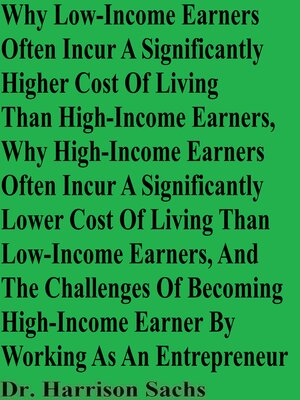Why Low-Income Earners Often Incur a Significantly Higher Cost of Living Than High-Income Earners, Why High-Income Earners Often Incur a Significantly Lower Cost of Living Than...
audiobook (Unabridged)
By Dr. Harrison Sachs

Sign up to save your library
With an OverDrive account, you can save your favorite libraries for at-a-glance information about availability. Find out more about OverDrive accounts.
Find this title in Libby, the library reading app by OverDrive.



Search for a digital library with this title
Title found at these libraries:
| Library Name | Distance |
|---|---|
| Loading... |
This audiobook is narrated by a digital voice.
This essay sheds light on why low-income earners often incur a significantly higher cost of living than high-income earners, explicates why high-income earners often incur a significantly lower cost of living than low-income earners, and delineates the challenges of becoming a high-income earner by working as an entrepreneur. Unbeknownst to most people, low-income earners often bear a significantly higher cost of living than high-income earners. As of July of 2025, it is a pervasive misconception that low-income earners often bear a lower cost of living than high-income earners. Low-income earners earn a negligible amount of fiat currency relative to high-income earners. Furthermore, low-income earners have a negligible amount of purchasing power relative to high-income earners. Low-income earners are people who are part of the real private sector workforce and who do not earn enough fiat currency by working real private sector jobs based on voluntary demand to exceed the low-income threshold. In a broken economy, low-income earners who are part of the real private sector workforce often have poor financial health. As of July of 2025, a copious amount of low-income earners who are part of the real private sector workforce are part of the indebted economic class. A destitute standard of living is the standard of living that people who are part of the indebted economic class have. People who are part of the indebted economic class do not aspire to have destitute standard of living for the remainder of their lifetimes. The indebted economic class is an economic class that is comprised of an exorbitant amount of indebted people who have egregiously low-income levels. The people who are subsumed under the indebted economic class are often unable to afford to attain their basic needs, such as the housing need and transportation need.







